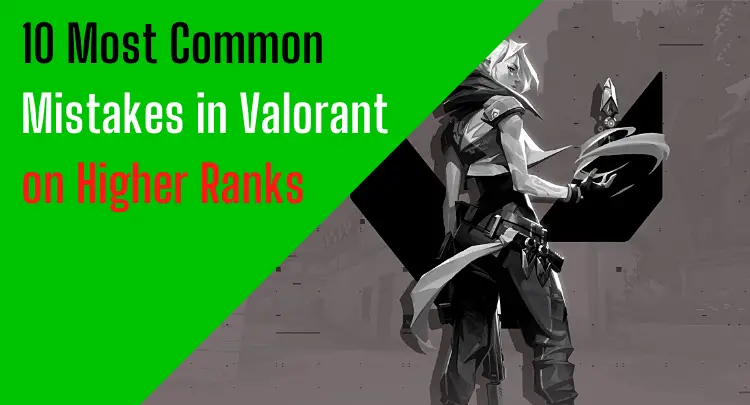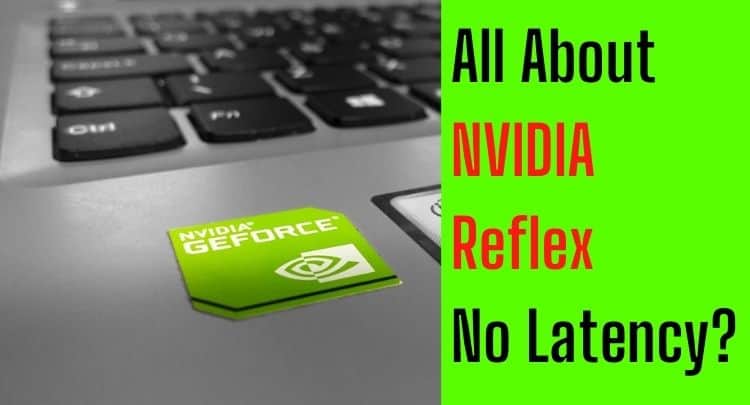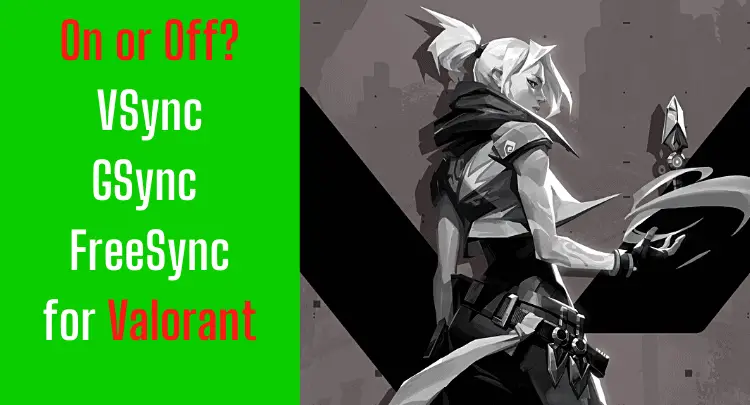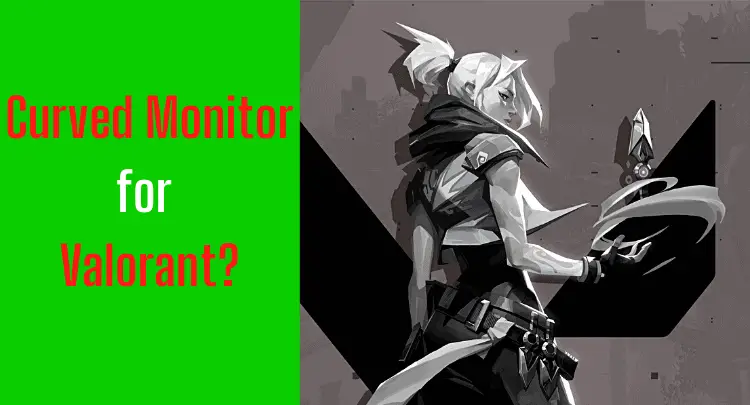It took me over 2,000 competitive hours of play in Valorant to reach the Immortal rank. I then spent another 500 hours playing at that level.
Along the way, I had to learn a lot on my own, learn a lot from others, and, most importantly, fix many mistakes.
And that’s what this blog post is about, whereby I’m not talking about the total slab beginner mistakes, but about mistakes that I still saw frequently enough, even just below Immortal.
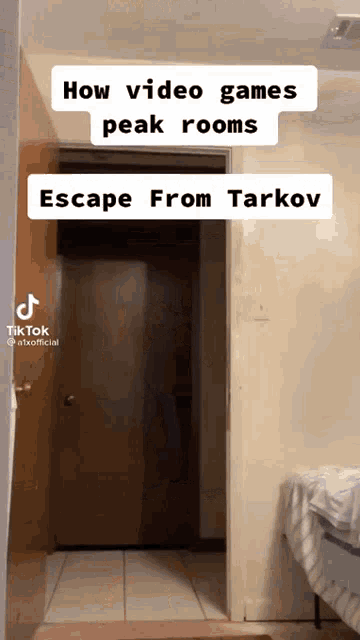
So let’s start loosely and deal with the question: What are the most common mistakes in Valorant I have seen on higher levels?
- No Coordinated Use of Special Abilities (Among the Team)
- If You Outnumber Your Opponent, Never Go 1 vs 1
- Don't Save Up Ultimate for Too Long
- Negative Mindset, Personally and in the Team
- Warm-up with Aimtrain AND Deathmatch or Public Game
- Be Predictable Just Because Something Worked
- Too Little Concentration on Use of Special Abilities
- Being More Proactive in Using the Peekers Advantage
- Never Give Up Mentally
- Wrong Agent for Your Style of Play
- Final Thoughts on Common Mistakes in Valorant
- Top-3 Related Posts
Note: This article was written in English. Translations into other languages may not provide the same linguistic quality. We apologize for grammatical and semantic errors.
No Coordinated Use of Special Abilities (Among the Team)
When two equally strong teams compete against each other, with the strength lying in the mechanical skills (aiming, movement, reaction, etc.), the team that plays better together naturally wins.
So far, so logical.
I repeatedly see that everyone acts for themselves while the team plays well together in communication, positioning, running routes, and buying economy when it comes to special abilities.
In no other FPS game is it so important to use your character’s abilities in unison with your team.
I’m also not talking about the obvious tasks in a round, like setting the smokes correctly to allow specific movements.
I’m talking about coordinated defensive actions when storming a site. Or conversely, coordinated aggressive attacks that have been rehearsed in training in most cases, which are incredibly difficult to defend against only when multiple special abilities are combined.
I have another tip on special abilities below, but my point here is that you must not think: I’ll use my character’s special abilities for my super moves.
On the contrary, the team will win where everyone puts their skills to work for the group. This includes communication, creativity, practice, practice, and practice, as well as improving analysis when the first attempts at coordination fail.
With this mistake, you’ll never make it to the Immortal level, so find ambitious teammates and rehearse some joint actions. It will be worth it.
Honest recommendation: You have the skill, but your mouse doesn't support your aiming perfectly? Never struggle with your mouse grip again. Masakari and most pros rely on the Logitech G Pro X Superlight. See for yourself with this honest review written by Masakari or check out the technical details on Amazon right now. A gaming mouse that fits you makes a significant difference!
If You Outnumber Your Opponent, Never Go 1 vs 1
I see this mistake so often, even on the highest levels. If there is only one enemy left, why are they all chasing him one by one?
It’s a bit like when the villain explains his plan to James Bond instead of just killing him, and in the end, the chatter leads to 007 getting out of the act in one piece.
Apart from giving the opponent a higher probability of a clutch, it also makes no economic sense to risk losing a player.
If you or your team outnumber the last opponent, there should be coordinated teamwork. As in CS:GO, in Valorant, a shot can also mean a kill, and it happens so often that a clutch is only made possible by the opponent getting the chance to take several headshots in a row.
Just never get involved in a 1-on-1 when you outnumber your opponent. Instead, find ways and opportunities to coordinate with your teammates to close in on the opponent and corner them.
When there is enough pressure, the opponent usually makes the crucial mistake and becomes easy prey.
Don’t Save Up Ultimate for Too Long
Let’s move on to the next mistake regarding special abilities.
Often, ultimates are saved for the one all-in situation in the game.
Of course, an ultimate is game-changing, and everyone wants to deal as much damage as possible with this ability and fully develop its potential. But saving it up for a situation that may never come, or come too late, has a significant negative impact on your match.
The sensible use of an ultimate usually already leads to new points for the next ultimate or leads to a safe win of the round. In both cases, you and your team will be in a good position for the next rounds, and you will have a better chance to win the next ultimate.
The wise use of an ultimate accelerates the acquisition of the next ultimate. This means that if you use ultimates more often, you will have more ultimates in the match.
Therefore my appeal to you: Use your Ultimate as soon as possible – but wisely.
Negative Mindset, Personally and in the Team
If you look at the top players in Valorant, they all have something in common. On the one hand, they have great self-confidence, and on the other hand, they stay calm and focused when things aren’t going so well.
I can’t emphasize enough how important your mental state is for your A-game (i.e., your best performance). But, unfortunately, this is very often underestimated.
Warming up before the game affects your mental state as much as the social structure in the team.
If, for example, someone is always late, then there will be a bad mood at some point before the game because everyone will have to wait again. And it is precisely this negative attitude on your part, but also in the team, that must be avoided at all costs.
The mindset should always be positive, and I do not mean that everything should always be fun. However, a negative mindset always leads to a drop in performance.
First, it affects just one player, maybe just you, then the others in the team get sucked into the downward spiral due to poor performance, avoidable mistakes, and lack of or even toxic communication.
I have seen this mistake countless times.
Professional handling of your own mistakes and the team’s mistakes may only happen in one case already during the game, namely on a factual level for the change of tactical elements.
If the opponent keeps overrunning you at one position, then the criticism and subsequent repositioning are perfectly fine. But if a stupid comment comes or you tell yourself that today is not your day, then the spiral of losing has begun and should be stopped immediately.
If you and your team are sensitized to this, it is not difficult to become more active, communicative, and focused again.
Warm-up with Aimtrain AND Deathmatch or Public Game
Many FPS games, including Valorant, have a deathmatch mode built-in for quick skirmishes in between. Ambitious players use the mode to warm up before the ranked match, and that’s just fine.
The problem with this is that it’s only half of the warm-up.
Most see training in an Aimtrainer and the pre-match warm-up in Deathmatch mode or a public game as two separate processes. But I can assure you. You will only perform your maximum performance if you combine both.
Of course, it takes more time before the actual match, but it’s the only way to prepare all your muscles and nerves for the task ahead.
So what is the difference? For me, it’s measurability.
If I do a few exercises in the Aimtrainer, I get immediate feedback on whether I am ready for a particular performance level through the analytics and my body.
If I get right into the game via deathmatch or public game, then I lack this measurability, and the gut feeling dominates, which can sometimes lead us quite astray.
In a real game, so many more variables are active that you can no longer distinguish whether your reaction speed is okay or the flickshot sat cleanly even the third time. Also, your team can hide a lot of your mistakes.
With an Aimtrainer, you can see your current status immediately and make corrections if necessary. Without this knowledge and required corrections, you start with a disadvantage compared to the players who look at both components.
And yes, I know that this takes extra time.
But I also know that it’s worth it and that it’s the only way to get to the top.
Be Predictable Just Because Something Worked
It’s human. It encourages you when you notice that your opponent has one or two tricks up his sleeve. Naturally, you want to win the competition and try even harder.
Maybe you try to use a certain move or trick because you think your opponent doesn’t know it yet, and you can turn the duel in your favor again. Unfortunately, if you haven’t practiced this often, it usually goes wrong.
As a result, your ego blocks you, and you make it incredibly easy for your opponent.
On the other side, it looks as if you always run with your head against the same wall.
When I saw something like that on the other team, I already knew that we would win the match.
When you’re in a state where you’re trying to prove to yourself that you should be winning the way you’re playing, then you’ve lost all flexibility in your head. You suddenly become predictable.
This can be in peek duels at always the same position, combinations of special abilities that should actually work well, or other repetitions that you do consciously or unconsciously to show that you are actually better than the opponent.
Believe me, this is a very common mistake.
In general, ego is one of the biggest obstacles in the self-development of a player.
If you want to become better, you have to learn to react differently in such situations. Therefore, there is no shame in suggesting a different tactic to your team or disciplining yourself for a few rounds to adopt a more defensive position of your own.
Again, as mentioned above, solutions must be sought through immediate communication within the team.
Two, Three rounds in this state can cost you and your team the entire match.
Communicate, try a more conservative approach or even a totally innovative one, but force yourself to change your style of play. Otherwise, you will make it much too easy for the opposing team.
In replays, you can see very well how the opponents have adjusted more and more to you and your repetitions. Sometimes other teams change the complete tactics to exploit your weakness.
Too Little Concentration on Use of Special Abilities
In hardly any other FPS game than Valorant, there is a balance between skills in aiming and regular weapons and skills in using special abilities. It’s definitely not enough to have incredibly good aiming.
If you don’t have a clear handle on special abilities with your agents, it’s not worth anything in the end.
Most players put far too little emphasis on training only with single special abilities. Of course, it’s more fun to practice trajectories of mollies and arrows with Brimstone or Sova, but a wall of fire or a teleport has to be perfect as well.
Do yourself a favor and train your special abilities disciplined with special exercises. As a result, you will act much stronger and more confident in the matches.
Also, the correct combination of special abilities with the rest of the team (see point above) is only as optimal as everyone can involve the special abilities.
Pixel-perfect actions can determine whether your team makes the point or is completely wiped out.
Of course, this doesn’t only work in dry runs but also rehearses in real matches. And, of course, it won’t always go well right from the start. That’s normal.
Only if you keep at it, are open to learning from others, and train consistently will you be much better overall in the end. You can only get to the Immortal level if you master the special abilities of several agents perfectly.
Being More Proactive in Using the Peekers Advantage
You may not be responsible for this mistake. However, if you haven’t studied Peekers Advantage, its concept is not very intuitive.
Typically, someone aiming at the edge of a corner should have the first shot at the opponent.
However, it works differently thanks to varying latencies and pings on the internet, screwed-up game servers with too low tick rates, and your input lag.
If the opponent has a pretty good idea of where you are and understands the concept of Peekers Advantage, he will come around the corner aggressively and fire faster than you.
How does this work?
At that moment, you have lost to the so-called Desync.
The information you are standing there and aiming at the edge is known to the game server and, therefore, the opponent’s client.
The position of your opponent changes the moment he comes around the corner. In the next moment, his client renders you, and he can fire directly.
Up to several hundred milliseconds later, the game server informs you that an opponent is coming around the corner. Only then does your client render the first pixels of your opponent into the image.
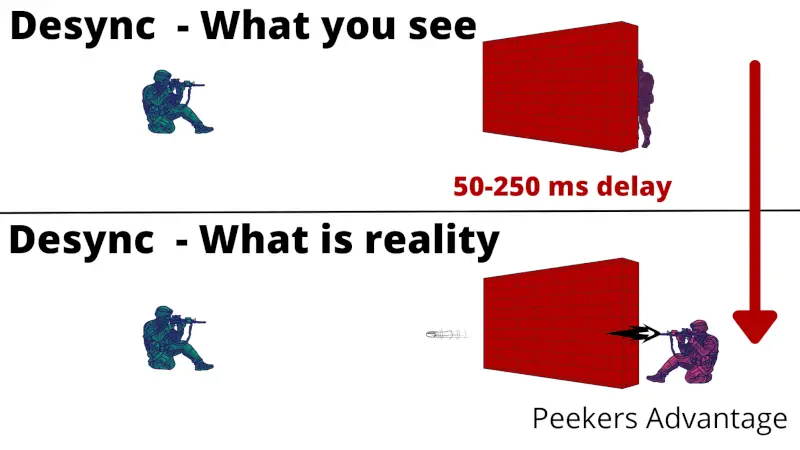
So when you pull the trigger, the bullet has already hit you or is already on its way.
The same problem exists in every FPS shooter.
Some developers try to catch it with some pre-calculation algorithms, but they haven’t really succeeded so far. Of course, the whole principle only applies to online games.
At a LAN event with a latency of less than 1ms for all clients to the game server, even the tick rate and the input lag don’t change the fact that the initial reaction should be on your side.
What will you hopefully learn from this now?
- If the opponent can know where you are, then you’d better face him aggressively, because then in the best case you have the Peekers Advantage on your side and in the worst-case nobody has an advantage. Then finally the pure skills decide
- If the opponent can’t know exactly where you are, then the Peekers Advantage will have no noticeable effect, because the opponent may see you first, but by the time he pulls the Crosshair on you, you’ve already pulled the trigger. Prerequisite: Correct crosshair placement.
Never Give Up Mentally
If I may not have been the best at some of the skills on the teams I’ve played within my career, there’s one thing I’ve always excelled at, and maybe that’s why I’ve always secured a permanent seat.
A round isn’t over until the game says it’s over. And a match isn’t over until the game says it’s over.
Giving up too quickly in mind is a very costly mistake.
For example, when the plan or tactic in the round doesn’t work or when a perfect move causes half your team to fly apart in a few seconds. When you haven’t hit anything for several rounds in a row and get again into a 1vs2 situation. For many players, the round is immediately checked off in the head according to the motto: This will be nothing, but we will make up for it in the next round.
That’s nonsense.
You will get into many such situations, and every time it is your duty to yourself and the team to do everything to get the maximum out of it.
Maybe you can’t disarm the spike with a feint, but you can still take an opponent with you. On the other hand, perhaps you have to be really intelligent to evade the opponents so that the other team doesn’t get even more money. Or just because you remember at that moment that the round isn’t over until the game says it is, you confidently go around the corner, surprise the opponents, and make a vital clutch.
I have seen countless times that you can tell by a player’s body language alone that a round or a game has been given up on internally.
Mindset and psyche affect all your skills.
Always.
Wrong Agent for Your Style of Play
Finally, a classic, which also occurs in CS:GO, but in Valorant, the special abilities are much more game-changing – especially in the higher ranks.
As mentioned above, Valorant is an absolute team game by design and one where agents have different strengths, weaknesses, and functions. Thus, the developers want a team to complement each other to win.
Now, each player has a certain style of play that has been formed from their history with FPS games and at some point is certainly not changeable.
Some play more passively and others more aggressively. Some feel very comfortable in the second line as a backup and others need the feeling of breaking the frontline. There are quarterbacks, wingers, defenders, etc., different tactical roles just like in other sports.
However, many players make the mistake of never analyzing which role their strengths lie in, especially when it comes to special skills.
What follows are lousy Reynas who don’t make any entry-frags. Or a Phoenix who always waits in the second row until something happens. Or a front-running Brimstone that reminds a bit of Leeroy Jenkins.
Maybe the mistake doesn’t affect you because you’ve thought it through, but most players take the agent who seems cool to them or who can get the most attention.
You are not helping your team at all. Especially not if another player would be better suited for the agent and you block it.
In the higher levels, you and your team can only survive if everyone plays at the optimum level.
You won’t reach Immortal rank with players who should be better swapping agents. You won’t recognize the best player on your team by the number of kills.
Valorant is too complex for that.
A very good Sage is at least as important as a great Jet. Of course, only if the skills are used correctly and in concert, otherwise the synergy effect fizzles out.
So really give it some thought after you’ve tried a few agents.
Analyze your game by watching a few replays. Include your emotional world as well.
In what situations do you play your A-game?
In which situations did you feel uncomfortable?
What special skills do you instinctively use to match the rest of the team?
These are not easy questions, but the answers will make you a better (team) player.
Final Thoughts on Common Mistakes in Valorant
Hopefully, one or the other error was mentioned, which was previously unknown to you or which you have now discovered in yourself while reading.
Mistakes are always good when they are discovered, analyzed, and then corrected.
Recognition of mistakes is the first step on the way to becoming a better player.
Valorant is perfect for Esports because even at the highest level there is still enough room for mistakes and improvements.
However, you will need to fix all of the mistakes listed here if you want to reach the Immortal rank or become active in Esports.
Just start with it.
Today.
If you have a question about the post or pro gaming in general, write to us: contact@raiseyourskillz.com
Masakari – moep, moep and out!

